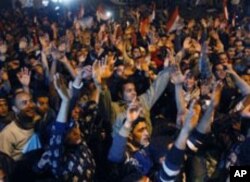America's six-million Jews have long been politically divided over what's best for Israel's security. Now, those on the left are putting their faith in an Arab democratic awakening, while those on the right are warily watching the developments sweeping the region.
The developments were high on the agenda at two major Jewish gatherings this week - and at a meeting of presidents of Jewish organizations with President Barack Obama.
The first gathering was the annual meeting of J-Street, a Jewish group on the political left, which drew thousands of participants.
While J-Street focuses much energy on opposing Israeli settlement policies, many people attending this year's get-together also hailed the democratic uprisings in Arab countries.
Rabbi Lynn Gottlieb said she wept when she saw Egyptians celebrating the demise of former President Hosni Mubarak. "Yay freedom!" she said, choking up with emotion once again.
Gottlieb describes herself as a Palestine solidarity activist. Last year she faced Egyptian security forces when she took part in a Gaza Freedom March in Tahrir Square.
"And so I have a feeling of how much courage [they have], especially with people dying all around them, their friends, and colleagues, and family members, to demand democracy," she said.
Another rabbi, Michael Lerner, is editor of the Jewish magazine Tikkun. Early in the Egyptian revolution, he wrote an op-ed piece on the website of the Arabic language news broadcaster al-Jazeera. It was titled: Jewish Prayers for Egypt's Uprising.
Lerner says Jews have sympathized with other peoples' liberation struggles since their own biblical story of emancipation from slavery - as it happens - in Egypt.
"So when we support the Egyptian struggle and the other Arab struggles," he said, "we see this as a very important step towards global freedom for all, which is the one path that we believe is critical for security for the Jewish people and for Israel also."
In recent years, J-Street's membership has soared and it has become an influential voice in the debate over Israel. But the group is still relatively small.
On the other hand, the Conference of Presidents of Major American Jewish Organizations represents 50 of the biggest groups. The Conference also met this week in Washington and its members said they expressed their views at a private meeting Tuesday with President Barack Obama at the White House.
Many American Jewish leaders initially saw Mr. Mubarak as a bulwark for peace. But Kenneth Bialkin of the America-Israel Friendship League says they are now encouraged Egyptian protesters did not emphasize religious extremism and for the most part did not express hatred toward Israel during the revolution.
"What we are looking to," he said, "is the question of whether in Egypt and other places, the voice of the people will stress demands for improvement, for Westernizing their society, for spreading the base of participatory democracy, or whether it will set the stage for what happened in Iran."
Iran's 1979 revolution created an Islamic theocracy that has threatened to destroy Israel. Many Jews are especially concerned about Egypt because its peace treaty with Israel, signed the same year as the Iranian revolution, is seen as a cornerstone of regional stability.
But Morton Klein, president of the Zionist Organization of America, says despite the peace treaty, hatred of Israel and Jews is strong in Egypt. He argues that the country is not ready for democracy and could vote extremists into power.
"If you have a very hostile culture, elections will only elect bad people," he said, noting the militant group Hamas won elections in Gaza.
Although Egypt's military has said it will honor the peace treaty, Klein says America should threaten to cut aid and Israel should threaten to reconquer the Sinai Peninsula to prevent a future Egyptian civilian government from breaking the accord.





